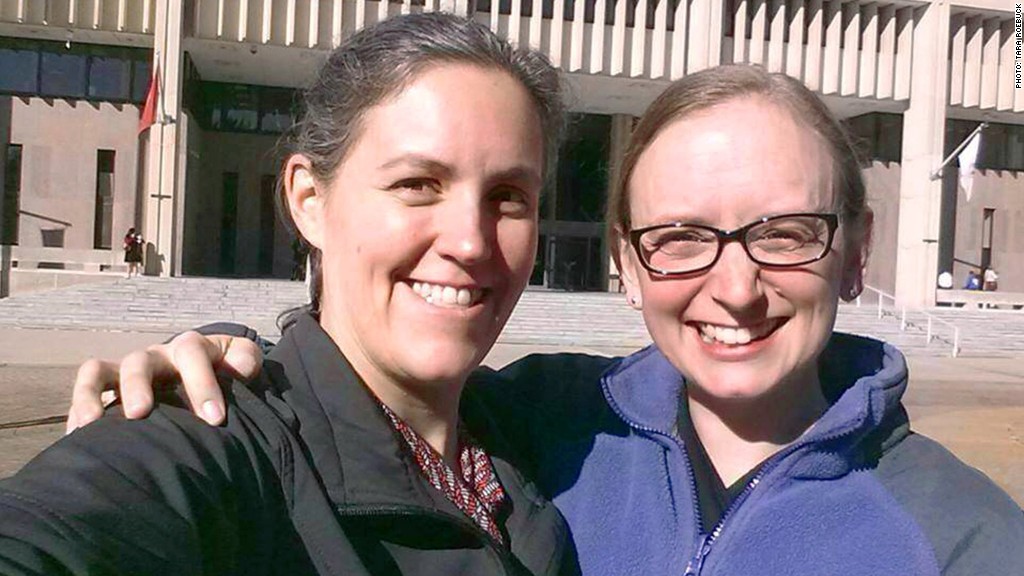
Married same-sex couples finally have the right to file their federal taxes jointly this year. But for many of those living in states that don't recognize their unions, this will be the most complicated and expensive tax season yet.
Dave Greenbaum, 43, expects to spend more money than he ever has before to get his taxes prepared this year. He and his husband Mike Silverman, 41, were legally married in California in 2008 but they now live in Kansas, where same-sex marriage isn't recognized.
So now that the Defense of Marriage Act has been overturned and more than 1,000 federal spousal benefits have been extended to same-sex couples, Greenbaum and Silverman are able to file jointly at the federal level for the first time. But in Kansas, they will still need to file separate state returns.
That means their accountant will need to fill out a total of five returns -- two separate state returns, one joint federal return, and two separate federal returns that won't actually get filed to the government but will be used to calculate individual state liabilities.
Related: Same-sex marriage ruling - The financial impact
"We pay the accountant by the hour, and she's going to have to redo everything and file double the returns," said Greenbaum, who paid around $600 to prepare their returns last year. "We don't know how much extra it's going to cost yet, but I'd just expect it to be around double."
They will also be amending their federal tax returns to reflect their married status for the past three years, adding even more to the tax preparation cost. Doing so, however, will reduce their tax liability for those years, resulting in refunds from the IRS.
Whether a couple qualifies for refunds depends on their income: if one person is earning far less than the other, then filing jointly could result in thousands of dollars in tax savings -- and big refunds for past years if returns are amended. But as the income difference shrinks between the two people, so does the tax benefit. And, in many cases, couples will actually owe more by amending past returns because they no longer qualify for credits that they would have received had they filed separately or are hit by higher tax rates.
More than the extra expense of getting their taxes in order, Greenbaum said he's upset that he is still forced to "lie" about his marriage by filing as a single taxpayer on the state level, even though he is now considered married by the federal government.
Any couple who lives in one of the more than 30 states where same-sex marriage isn't recognized for tax purposes is likely facing similar costs, confusion and frustration, says Anthony Infanti, a University of Pittsburgh law professor who specializes in tax issues for same-sex couples.
Related: Map of same-sex marriage in the United States

"It's going to be a rude awakening," he said. "Someone who didn't need help before might need it now."
And hiring a tax preparer who is well-versed in the complicated world of same-sex marriage law doesn't come cheap.
"We're certainly fortunate that we're both working professionals and can afford a tax preparer," said Daire Roebuck, who married her wife Tara in Maryland last October but now lives in North Carolina, where same-sex marriage isn't recognized. "I worry about people who are out there trying to prepare their own."
Even though Daire expects to pay at least a few hundred dollars more on tax preparation this year, she said it's worth it not to have to go through the time consuming process of filing multiple returns with different filing statuses on her own.
Overall, she says it feels good to be official in the eyes of the government -- even if the state hasn't followed suit. "It was still nice signing a return together, it's our first time signing a government tax form together," she said.
Related: Same-sex marriage ruling - 'A huge relief'
Making things even more complicated, some states that have yet to legalize same-sex marriage are opting to recognize the marriages for tax purposes only, while other states are in the midst of lawsuits that could determine the state's stance on whether married same-sex couples can file jointly, said Thomas Spychalski, a partner at tax firm ParenteBeard.
So it's crucial for couples to check with their state for guidance on how to file -- or hire a preparer who knows the latest developments.
"For some couples it might even make sense to file for an extension because states keep flip-flopping -- one minute you can't file as married, the next minute you can, so it's hard to plan," Spychalski said.
The good news is that in states where same-sex marriage is recognized, couples should have a much easier time getting their taxes filed this year -- since they will be able to file jointly at both the state and federal level for the first time.
"For them, it will be just like anyone else who is married and filing taxes for the first time together," said Spychalski.
